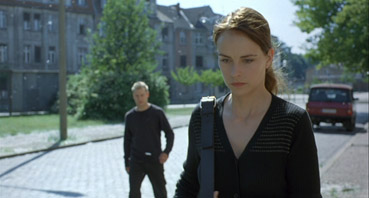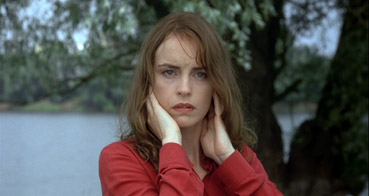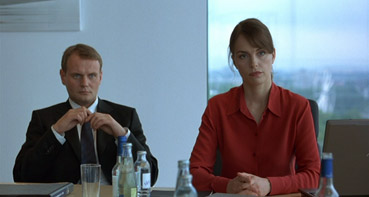|
Do you ever have the sense that fifteen minutes into a film you know exactly how it's going to end? If you've watched your share of modern Hollywood fare then it's a feeling you're probably getting rather used to by now. But it's a rarer experience for European and world cinema, which still manages to deliver stories that do not play to formula or walk obvious paths of narrative progression. Sometimes, of course, clues to convention are laid out as deliberate misdirection, playing on our expectations and then usurping them. I'm always rather pleased when that happens.
Make no mistake, Yella is a smart and quietly gripping drama, but precisely twelve minutes in I felt sure that I knew how it was going to end. I considered the possibility that I was being misdirected, but as the drama unfolded I became increasingly certain I was on the money. And I was. To avoid spoiling things for those without my viewing history I'm not going to elaborate further, but I can't imagine I'm going to be the only one who experiences a sense of déjà-vu on their first viewing of this latest film from German director Christian Petzold.

The good news is that this narrative twist is far from the be-all and end-all of the story and functions largely as device to enable the character self-exploration that is the film's raison d'être. Everything revolves around the young woman of the title, who at the start of the film is shown walking away from her possessive and aggressive husband Ben in more than the physical sense. She's landed an accounting job in Hamburg, in part to put herself some distance from him, but she foolishly allows him to drive her to the airport, a journey that nearly ends in disaster when he dramatically tries to kill them both.
Once in Hamburg, Yella discovers that the company that hired her is in receivership, but a chance encounter with venture capitalist Philipp lands her a one-off job to pose as his assistant at a business meeting. Suspecting her professed knowledge of balance sheets is a front, he employs her to unsettle his clients through a pre-arranged series of trade tricks (stare at one of them and then at his accounts, whisper something when given a signal, and so on). Initially uncomfortable at a meeting in which she is clearly out of place, she has a moment of epiphany when she knocks over and breaks a glass of water – an incident that strangely no-one else appears to have noticed – and instead of following Philipp's instructions she grills the clients over irregularities in their accounts and effectively seals the deal. Philipp is impressed and further jobs soon follow, but this new found road to fulfillment proves to be littered with problems and uncertainty. Her relationship with Philipp is twice put in jeopardy when he unexpectedly loses his rag in a manner uncomfortably reminiscent of the incendiary Ben, and when Ben himself tracks her down to her hotel room, she runs into the arms of her new colleague, where a nicely handled yes-no-yes moment sees them move up a rung to lovers. More troubling for Yella are her random drifts from the here and now, when the sounds of her immediate surroundings become replaced with those of running water. Nicely done in themselves, they did serve to confirm my suspicions about the ultimate outcome of the story, although they also unsettlingly reflect the sense of isolation that continues to dog Yella in her new career.
The development and re-evaluation of Yella's attitudes and ambitions is generally well handled. Particularly effective is the emergence of her super-cool business acumen, an ability that impresses Philipp and intimidates their clients, giving her the sort of power and control that was previously denied her by the possessive aggression of her husband. The services she provides to Phillip, however, also have a ring of prostitution about them, hired as she is on a job-by-job basis to act effectively as a corporate escort for which he is always paid in cash.

That we side and sympathise with Yella, even as she becomes someone we might hold in contempt in the real world, is due in no small part to actress Nina Hoss, whose performance is a virtual masterclass in suggestion and emotion delivered through facial expression and body language. The acid test for her character and for our relationship with her comes late in the story, when she blackmails one of Philipp's clients to procure the funds her new lover needs to follow his own capitalistic dream, pressure she applies with an icy coldness that masks an increasing instability that's bubbling beneath.
The filmmaking mirrors both the world into which Yella has moved and her sense of emotional isolation, precise compositions that are often striking for their formal minimalism and lack of clutter. People are observed individually, in pairs, or occasionally in small groups and by a camera that moves only when it needs to. It's a style that some will no doubt regard as cold and detached, but one that I and many of those who attended our cinema screening found curiously compelling. Sound plays a crucial role, particularly in Yella's moments of disorientation, where Petzold resists the temptation for visual trickery and makes the experience a purely aural one, but no less effective for that.
Opinion, it has to be said, has been quite starkly split on the film, a generally positive critical response countered by those who found it boring or insubstantial in narrative and character. I'll admit to being a little disappointed by the recycling of a familiar narrative trick and the number of obvious clues that pop up intermittently to confirm it, but in other respects I found myself engrossed by Yella's journey and Petzold's handling of it. Yella is my first exposure to the cinema of Christian Petzold and the acting skills of Nina Hoss, and both made enough of an impression for me to want to see more.
Another strong transfer from Artificial Eye, the anamorphic 1.85:1 picture displaying consistently good contrast and detail. Colours appear to be true, the real transfer test being Yella's red-bathed bedroom at her parents' house, which is reproduced here with no trace of bleed or compression problems. The subtle blue bias in many scenes is intentional and used with purpose.

Dolby 2.0 stereo and 5.1 surround tracks are available and both are of excellent quality. Location sounds and effects in particular are crystal clear and display a superb dynamic range, with deep, full bass and pin-sharp trebles. The mix during Yella's disorientation spells is especially effective. The 5.1 has the edge over the 2.0 for its use of the surrounds.
Interview with Christian Petzold (44:54)
Conducted in English, with the occasional word chipped in by an off-camera translator, this is an engaging chat with an enthusiastic filmmaker that runs for half the length of the film itself and covers a lot of interesting ground. An early-on admission of one of the film's influences explains my familiarity with certain aspects of the narrative, while some interesting detail is provided on his working relationship with Hoss and the journey from dialogue-filled script to pared-down finished film. Petzold's passion for the medium comes through clearly, and he emphasises his love of cinema as the location in which to experience it.
Interview with Nina Hoss (34:42)
Also conducted in fluent English, the lively and enthusiastic Hoss talks about her approach to the role and film acting in general, working with co-stars Devid Striesow and Hinnerk Schönemann, and the collaborative approach she has with director Petzold, with whom she has worked twice before. As with Petzold's interview, this is an informative and enjoyable extra.
Trailer (1:52)
An intriguing trailer that gives you a flavour of the film without revealing what it's actually about.
Also included are filmographies for Christian Petzold and Nina Hoss.
Compellingly directed and performed, Yella lost a few points with me for its reworking of a narrative trick I've seen enough now to recognise the moment it kicks in, but scored a fair few back for its handling of the drama that unfolds within and its fine performances. Artificial Eye's DVD does very well by the film, a fine transfer and a superb soundtrack backed up by two very worthwhile interviews whose combined length comes close to matching the film itself.
|